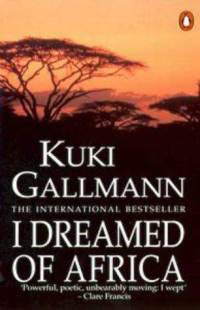
This book recounts the author’s life in Kenya. Originally from Italy, she had always been fascinated by Africa, and eventually moved there with her second husband, buying a large ranch on which they kept cattle and provided a safe haven for wildlife.
She provides an interesting picture of Kenya in the 70s and 80s, at the tail end of the Happy Valley period, and includes many accounts of her intimate experience with African wildlife. The heart of the book however is her various bereavements. Her husband is killed in a car crash, and then a few years later, her son, an amateur herpetologist, is killed by a puff adder. Their funerals are minutely recorded, as are those of two or three of her friends.
Now, you would have to have a heart of stone not to be moved by this.
I think I may have a heart of stone.
Great suffering does not necessarily make a great novel. Heartfelt sincerity, while important, is not all you need. (Oscar Wilde: “All bad poetry is sincere.” Ouch)
Now, before you start hating me in the Comments, let me give you an extract, and you hand on heart try and tell me that this is not dreadful:
There, on the extreme edge of the Great Rift Valley, guarding the gorge, grows an acacia tree bent by timeless winds. That tree is my friend, and we are sisters. I rest against its trunk, scaly and grey like a wise old elephant. I look up through the branches, twisted arms spread in a silent dance, to the sky of Africa . . . A last eagle flies majestically back to nest on steep cliffs.
Clearly, while she may have dreamed of Africa, she did not dream of writing without cliché.
In the interests of fairness, I should say it is very readable, especially if you skip the funerals. I couldn’t sleep last night, and polished off about 200 pages from 1am.
I admire the lady, who has a genuine and inspiring love for the Kenyan landscape, and has had a genuinely terrible time; but I just cannot admire the writer.

To me this is what I expect from every non-African who writes about Africa. They may all not indulge in it but that's what I expect them to do. They see the trees and the animals but not the people. And for those who see the people, they see it as lower than the animals they have come to save and protect. Everything they don't understand is negative and cannot help the people who practice it. It can only harm. So to me the cliche is the way they should write. It's good of them to do so. In fact, anyone who don't write in that monosyllabic tone, that has come to represent Africa, perhaps never came here and landed somewhere on the moon. We have always been butchery and cannibalistic, haven't we? I don't think I am even using the internet now! Don't you think so?
Well, I think quite a lot of people do get a bit overly gaga about the animals, but in this Gallman lady's defense, she does write a lot about the people too – which I didn't comment on very much in my review, I guess!
Well in all actuality she is writing a true story of her life what happened to her so all of you who have bad things to say I say you are all heartless and can go shove it up your @$$ have a good day
P.S. Kuki Gallmann I am so sorry for you and I wish better things for you and I know someday you will she both your son and husband who I know you miss dearly
Oh dear! I did say I do admire the lady, and I feel for her troubles x
I burnt the book. Cath de Swardt can vouch for that. She was there.
Yes. We burnt it. Were in need of firewood and it was cold. And to be frank, the book had it coming due to the reasons you elucidate above. Cx
And yet, some people absolutely love it. It's not often a book divides opinion so totally. I actually had to delete one comment because the commenter was genuinely abusive – she loved the book so much, she couldn't bear that I didn't!